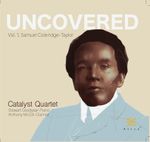|
Back
01/29/2021
“Uncovered: Volume 1”
Samuel Coleridge-Taylor: Quintet in G Minor, opus 1 – Fantasiestücke, opus 5 – Quintet in F-Sharp minor for Clarinet and Strings, opus 10
Catalyst Quartet: Karla Donehew Perez, Jessie Montgomery (violin), Paul Laraia (viola), Karlos Rodriguez (cello); Stewart Goodyear (piano); Anthony McGill (clarinet)
Recording: Sauder Concert Hall, Goshen College, Goshen, Indiana (July 28-30, 2019) – 76’04
Azica Records ACD-71336 – Booklet in English

   
Stewart Goodyear, the Canadian pianist and composer, and Anthony McGill, clarinetist and the first African-American principal in the history of the New York Philharmonic, have joined the Catalyst Quartet in a new album, “Uncovered: Volume 1”, featuring chamber music selections by Samuel Coleridge-Taylor.
Coleridge-Taylor (1875-1912) was an Afro-British composer who entered the Royal College of Music in London at age 15 where he studied composition with Charles Villiers Stanford, one of the leading music educators and composers of his day. The son of a white British woman and a black physician from Sierra Leone, Coleridge-Taylor is mostly known for his cantatas, including The Song of Hiawatha, a number of selections that incorporate African themes, such as, The Legend of Kubla Khan and many others.
Less widely known but worthy of greater attention are purely instrumental works including a violin concerto and sonata. This album of two quintets and a set of fantasy pieces will open the door for many listeners to a welcome world of musical intelligence, elegance, and refinement.
The album opens with Coleridge-Taylor’s Piano Quintet in G Minor, opus 1 which, like the other works in this collection, was composed during his years at the Royal College. This is a delightful selection, full of freshness and youthful ideas, demonstrating a thorough understanding of the instruments as well as compositional architecture. The quartet provides a reading that is full of feeling, but also of a musical wisdom far beyond the composer’s 18 years. In the first movement, Goodyear’s ringing tone and deft phrasing blends seamlessly with the ensemble’s soft, romantic sweep. There are some attractive runs in the cello; the overall feeling is Brahmsian, yet absolutely original. At no time did the piano overshadow the strings, as is often the case in chamber music, but all played not only with accuracy and forethought, but with a synchronicity of spirit that was most satisfying to hear.
Following a “Larghetto” with some appealing contrapuntal complexity, the composer presented a lively “Scherzo” filled with drama, but not too much. There was nothing cloying or excessively sweet in either of the performances nor in the work itself, but there was a sense of flow and purposeful direction that kept this listener’s heart and mind engaged right through the final movement’s coda in G major.
A freer approach accompanied the Fantasiestücke, opus 5 for string quartet. The title conjures up thoughts of Robert Schumann’s capricious miniatures, and indeed, these short pieces are on fire with sensation and imagination. The Catalyst Quartet performs with a single voice, but what a voice it is, charged with varied moods and respect for each others’ skill and insight. There are some sweet Dvorákian moments, such as a "Humoresque" with an enchanting trio, reminding us that our favorite composers live on in others whom they have influenced.
The final work in the album is the Quintet in F-Sharp minor for Clarinet and Strings, opus 10, featuring Anthony McGill, best known as the principal clarinetist of the New York Philharmonic. McGill does not attempt to outshine his compatriots: his elocution and phrasing blend so beautifully with the string ensemble that one wonders why more composers have not written for this combination of instruments. I was struck by his instrument’s shimmering tone and the reserved articulation that allowed other voices to emerge, speak and recede again, like waves on the shore. At times, it was almost as though a single held tone on the clarinet cradled a melodic fragment from the violins. And yet, this work is not just attractive special effects, but a solidly crafted composition from beginning to end.
The “Uncovered” series is intended to showcase important composers of color whose works have not been heard as widely as they deserve. There is no doubt that Black composers have not been recognized and appreciated in proportion to their talent and suffered egregious discrimination. However, Coleridge-Taylor, at least, was not entirely unknown and forgotten. During one of his visits to The United States, he met with President Theodore Roosevelt, a rare event for a person of color at that time. As a child in the 20th century, I read about Coleridge-Taylor in my school library and was impressed by his achievements. In one of those old music texts, he is listed in a glossary of musical greats between two other luminaries of African heritage: Ornette Coleman and John Coltrane. Wherever they may be, I am sure the spirits of these two jazz giants are more than pleased to share his company.
Linda Holt
|